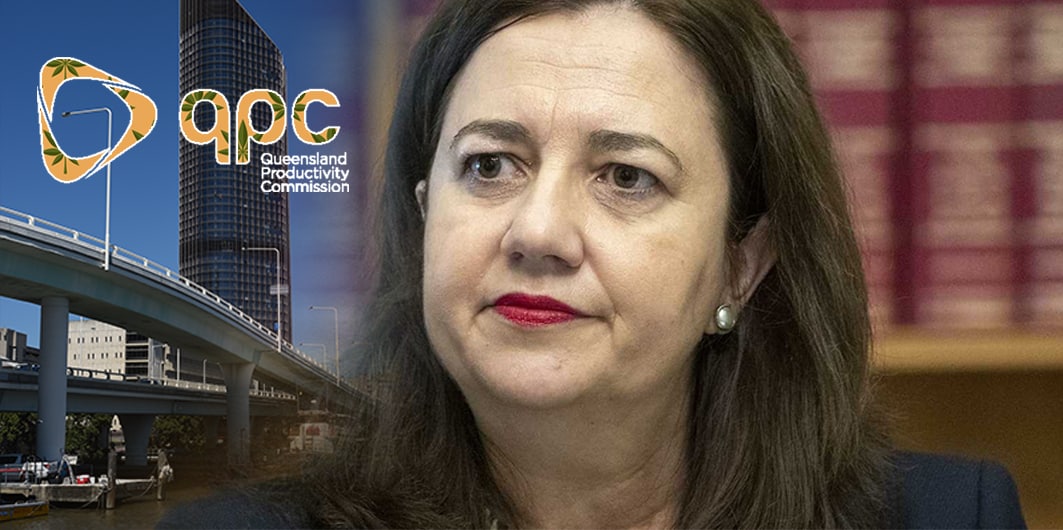Productivity Commission Recommendations for Drug Policy Reform Snubbed by QLD Labor Government… on Election Year?
Queensland Premier Annastacia Palaszczuk has recently ruled out decriminalising drugs. Her statements stand in stark contrast with projections from her own Government reports, indicating that drug decriminalisation would lead to drastic cuts in the percentage of the population incarcerated.
Additionally, the Government could be saving hundreds of millions of dollars every year… but, unfortunately, Queensland Labor leadership has made it clear that it doesn’t want to take the political risk.
Decriminalisation of substance use was the centrepiece of 42 reforms proposed by the Queensland Productivity Commission (QPC), in an examination of the state’s overcrowded prison system, delivered last year.
A couple of weeks ago, the Palaszczuk Government released its response to the mammoth 516-page report. Their comments include commitments to the implementation of a series of criminal justice reforms, as recommended by the commission.
Disappointingly, however, the Government has rejected the report’s calls to decriminalise cannabis and other drugs, practically going against the evidence-based findings of their own report.

Key Findings:
- Queensland spends $500 million a year on drug law enforcement.
- Queensland Productivity Commission: “All available evidence” shows the war on drugs fails to restrict usage or supply.
- Proposed reforms would lower prisoner numbers by up to 30 per cent in five years.
The Benefits of Decriminalisation (According to the QPC)

The QPC’s cost-benefit analysis found that decriminalising the use and possession of cannabis would save about $850 million. This could rise to over $1.2 billion if the Government chose to fully legalise and regulate the supply of “lower-harm drugs, such as cannabis and MDMA”.
According to the report, in order to address the growth in prison numbers, Queensland will need to invest an additional $3.6 billion in the next five years to house an additional 4200 prisoners. [3]
The commission also estimated that prison populations across Queensland would drop between 20 to 30 per cent by 2025 – if drugs were to be decriminalised today. [3]
This would save somewhere between $165 million and $270 million in annual prison costs, avoiding $2.1 billion in prison investments. Over 2 billion dollars, that could instead be funding rehabilitation and treatment programs – or otherwise going towards education, research and development, public health, infrastructure, and other long-term, forward-thinking projects with broad-spectrum positive impacts. [3]
The report also found that decriminalisation would improve the lives of drug addicts – without increasing the rate of drug use (ha, imagine that!). The report noted the lack of evidence for an increase in consumption where cannabis has already been decriminalised – like in the case of Portugal, for instance.
Imprisonment is Not Working
The Productivity Commission report has uncovered – in painstaking detail – the steady rise of imprisonment rates across the state. It has highlighted the costs of incarceration in contrast to rehabilitation. [3]
In 2018/2019, Queensland broke records, reaching the highest rate per 100,000 people incarcerated since federation — with Indigenous people in particular being imprisoned at rates 10 times higher than the general population. Almost half of all prisoners have been hospitalised for mental health issues, or have some history with ‘child protection’.
Further, as police detection of crimes improves, the prison population continues to grow, rising by more than 160% per head of population since 1992. It costs $111,000 in direct costs each year per prisoner, with another $48,000 per year in indirect costs. The QPC estimates it costs the state about $500 million to imprison approximately 1,840 people for drug-related crimes – annually. Prison investment threatens to balloon out of control without a transformative and rehabilitative approach to drug policy and criminal justice.
Australia is Experiencing a Drug Prohibition Crisis
There was a clear admission within the report that “all available evidence” suggests that the so-called “War on Drugs” policy framework has ultimately failed to attenuate supply or use. The report indicates that state policy has been ineffective for decades.

The Productivity Commission has also come to the conclusion that the law enforcement system in Queensland has fuelled illegal activity in black markets, contributing to the increased prevalence of harmful substances – such as the methamphetamine and opiates sold by criminal gangs.
“Illicit drugs are now responsible for more deaths than road accidents in Queensland…”
– QPC Report
Since 1997, the rate of drug-related accidental deaths in Queensland has jumped 144 per cent. It’s not just Queensland. [3] All across Australia – if you make an exception for the Capital Territory – you’ll hear a similar story.
Palaszczuk Embarrassed by Independent Commission

The Government has signalled that it is open to exploring the implementation of many of the 42 proposals. Deputy Premier Jackie Trad noted that the Government was implementing reforms, including the Action on Ice strategy, the Domestic and Family Violence Prevention Strategy, the establishment of a new Department of Youth Justice – along with a new youth detention centre at Wacol, of course. [1]
It was the Premier herself who went out of her way to flatly dismiss the idea of relaxing drug laws.
“There’s no plans for any decriminalisation, full stop,”
– Annastacia Palaszczuk, Queensland Premier
That’s right: just in case this wasn’t clear, the Government will not endorse the recommendation to decriminalise cannabis, with consideration of the regulatory framework around use – including, for example, the regulation of use in public places. Bummer.
This whole series of events has been a fiasco for the Queensland Labor Government. The administration that initially called upon the QPC to conduct the report in September of 2018, is the same administration that now backpedals and distances itself from the findings. It’s just too politically inconvenient for politicians who are used to triangulating.
This is a sad and disappointing response to the amazing work of the QPC by the Government. It displays a lack of regard for the findings of the detailed report, which developed its policy recommendations in light of hard evidence.
Labor Will Not Take Cannabis to Queensland Election
Just like they did with Adani, the Queensland Labor Government has once again forgone its principles. The party is bending to pressure from the LNP and Murdoch-owned news media to remain ‘tough on crime’, rather than taking the truly progressive stance and “shifting the Overton Window” on a range of issues.
While dismissing drug policy reform and embracing small tweaks to the criminal justice system might be savvy in a Machiavellian sense… it also displays a lack of foresight and common sense, as well as a deficit in compassion and empathy for the thousands of non-violent drug offenders suffering in prison.
There’s an election coming up this year… but in case it wasn’t already obvious, the LNP are even *worse* on this issue. Opposition Leader Deb Frecklington has called on the Government to get tougher on crime. Safe to say, the only viable party with a progressive stance on cannabis and the decriminalisation of drugs is the Queensland Greens.
Sources
[3] https://qpc.blob.core.windows.net/wordpress/2020/01/SUMMARY-REPORT-Imprisonment-.pdf













Great content! Super high-quality! Keep it up! 🙂